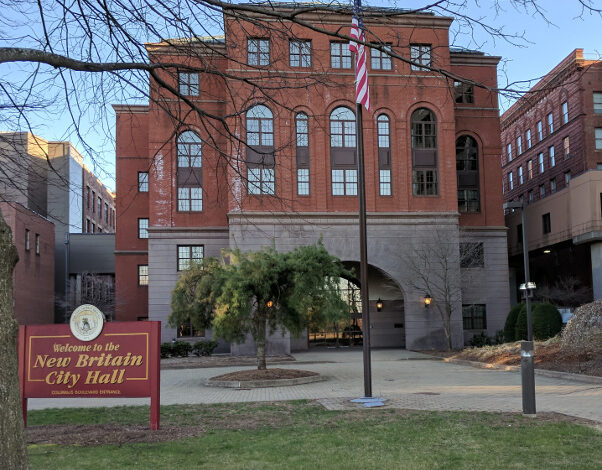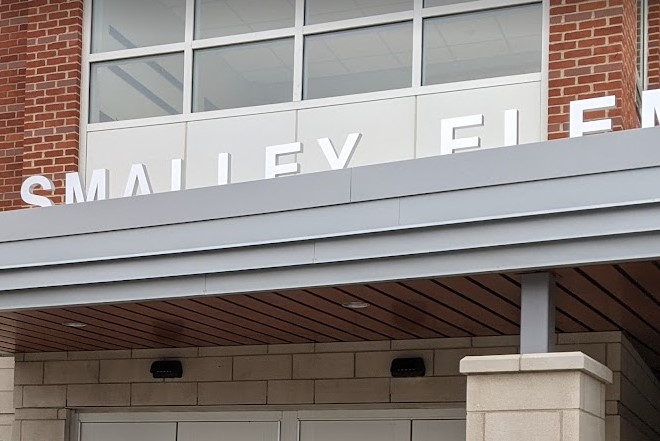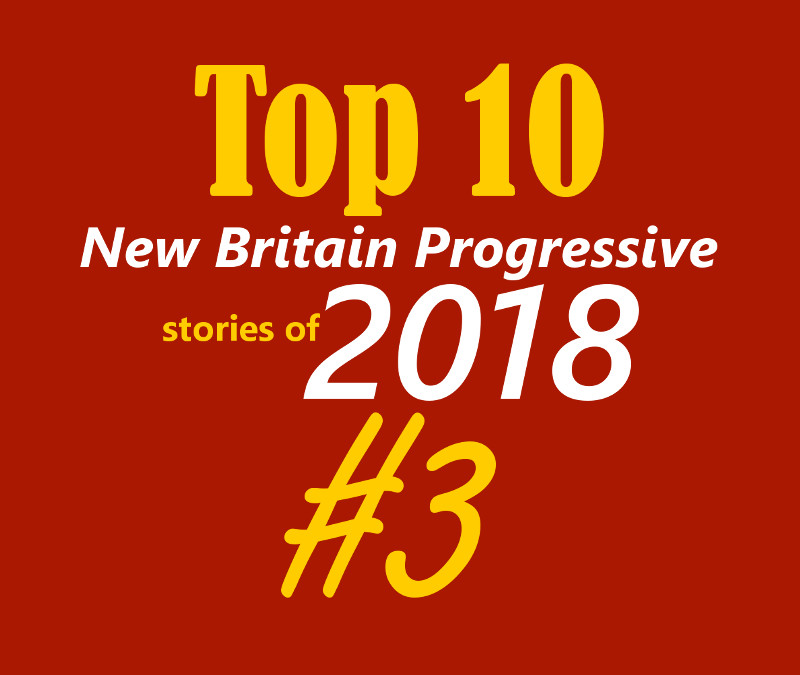
Top 10 of 2018: #3 – Stewart Budget Increases Taxes and Freezes Education
Many important stories have been covered by the New Britain Progressive in 2018. It may be difficult to name only a few articles as the top stories of the year, but there are a few the New Britain Progressive would like to share as our Top Ten. Other Top Ten stories can be found at “Top Ten Stories of 2018.”
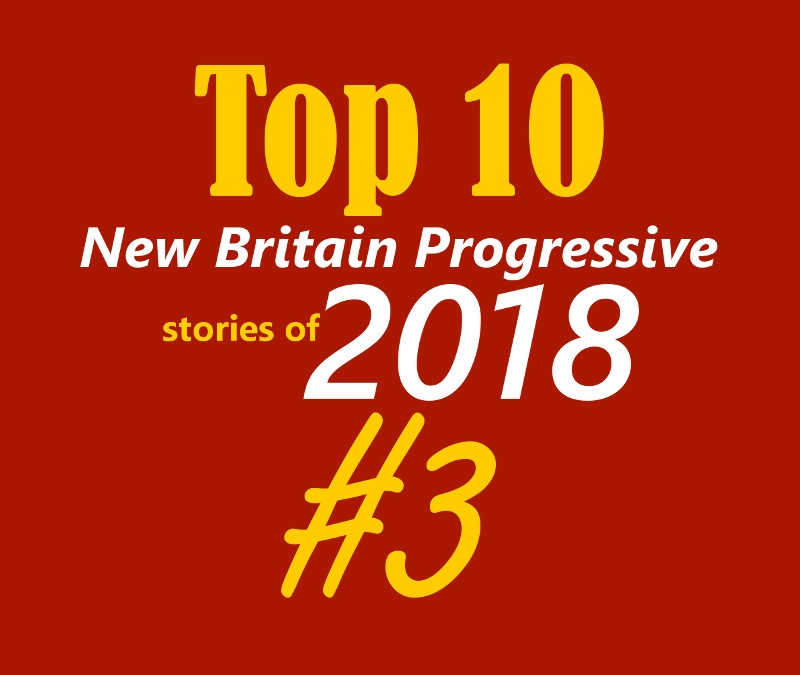
When Republican Mayor Erin Stewart proposed her 2018-2019 city budget, she said that it had, “no tax increase,” since it kept the city mill rate the same. Most years that would be true, but the 2018-2019 budget was the first after a once-every-five-years property tax revaluation that increased taxable valuations by 6.27%.
Others quickly said that keeping the mill rate at 50.50, as Stewart had proposed, was actually a, “huge tax increase,” since it meant that increased tax valuations would translate directly into tax increases. (Stewart Proposes “Huge Tax Increase” Despite Claiming “No Tax Increase”)
Meanwhile, Stewart’s budget contained no increase in city funding for New Britain schools, the New Britain Public Library or the New Britain Youth Museum.
Stewart’s annual budgeting also proposed increasing sewer rates (Sewer Rate Increase Proposed) and apparently proposed covering long-term deficits in the budget with non-recurring budget items with the apparent potential to leave a sizable shortfall in future years’ city budgets (Possible $11 Million Long-Term Deficit Apparently in Stewart’s Budget Proposal).
While residents organized to make their voices heard about the proposed budget at the city budget hearing (Community Activists Organizing for City Budget Hearing), City Council Democrats proposed, “an immediate hiring freeze and promotion freeze on all positions in the City,” citing, “fiscal challenges facing the City” (Council Democrats Propose Freeze on Hiring and Promotion).
The Council voted to approve the hiring freeze resolution. But the Council’s six Republicans opposing it (Council Approves Hiring Freeze, With Republicans Opposing) and Stewart vetoing it (Stewart Vetoes Hiring Freeze Resolution) blocked the resolution.
The Council Democrats proposed and the Council voted to approve a budget that reduced the tax increase in Stewart’s budget and provided an increase in school funding. (Democrats’ Budget Lowers Stewart Tax Increase, Increases Education Funding)
But Stewart vetoed the Democrats’ budget. Under the City Charter rules, Stewart’s veto meant that her original proposed budget took affect as the official city budget. This meant that the city’s tax rate was set at 50.50 mills, resulting in higher overall taxes than the Democrats’ the 49.977 mill rate proposal. It also meant the elimination of the Democrats’ proposal to increase school funding by $429,171. (Reported Stewart Veto Reverts Budget to Higher Taxes and Lower School Funding)
While the Council Democrats had staked out the direction they preferred the city budget be changed, Stewart exercised the powers she has in New Britain’s strong mayor system to put her original proposal budget into effect. In the end, that makes the city budget, including the tax increase and education freeze Stewart’s budget, and this one of the top three of the New Britain Progressive Top Ten stores of 2018.
Stewart Proposes “Huge Tax Increase” Despite Claiming “No Tax Increase”
April 13, 2018
Republican Mayor Erin Stewart’s budget includes what is being called a “huge tax increase,” despite her own claims that her budget is a “no tax increase” budget.
Stewart’s press release on her budget proposal says that she, “presented to the Common Council a $237.72 million budget for 2018-19 that calls for no tax increase and an overall reduction in spending.”
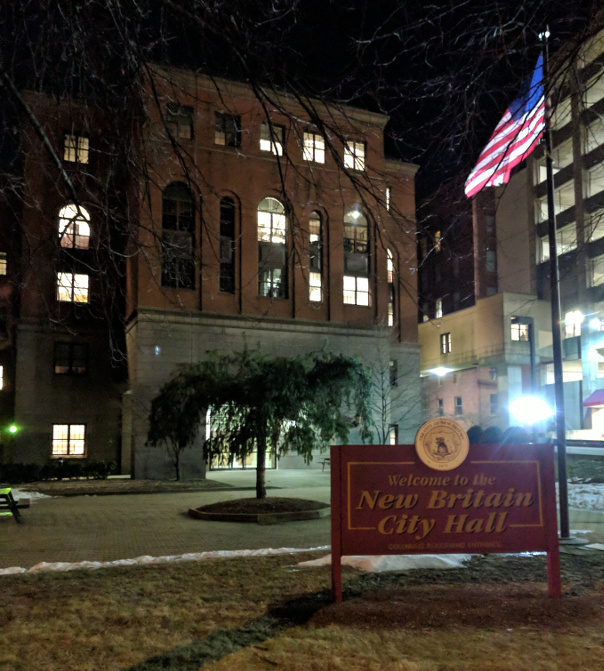
But some close to the city budget process are saying Stewart’s budget is, in fact, a “huge tax increase.”
While Stewart’s proposed budget for the 2018-2019 budget year would keep the property tax mill rate at 50.50, that same rate would result in an increase in overall taxes because the amount of property valuations used to calculate property taxes went up due to the recent once-every-five-years property tax revaluation.
In January, Stewart announced that the property tax revaluation had resulted in an overall 6.27% increase in the taxable valuation of property in the city. Keeping the overall amount taxes the same would have meant lowering the amount of the city’s mill rate enough to keep that 6.27% from resulting in higher taxes.
But it appears that the full amount of the 6.27% valuation increase would be passed on to taxpayers in the form of higher property taxes, under Stewart’s budget.
Stewart’s January statement said that the increase in overall residential property valuations increased by 5.11%. That figure includes single family homes, two to four family homes and condominiums.
How that increase would apply to individual homeowners would depend on their individual property revaluation. Those whose property valuation went down would see their property taxes decrease, while whose valuations went up would see a tax increase under Stewart’s budget plan.
While the 5.11% overall residential amount included condominiums, taken separately, condominiums’ valuations went down by 6.73%, which would result in generally lower taxes for condominium owners.
On the other hand, the valuation of single family went up, overall, by 6.32%, meaning that, as a whole, single family homeowners would apparently pay 6.32% more under Stewart’s budget proposal.
Valuations of apartment buildings of nine or more units increased by 17.88%.
Overall commercial real estate valuations went up by 10.08% and industrial real estate went up by 6.93%.
In addition to increasing taxes, Stewart’s budget proposal would also flat-fund education, while continuing relying on increased borrowing to keep the city’s annual debt service down.
Stewart proposed her budget at the April 11, 2018 City Council meeting.
The Council has sixty days from that date, under the City Charter, to act on Stewart’s budget.
Reported Stewart Veto Reverts Budget to Higher Taxes and Lower School Funding
June 19, 2018
Republican Mayor Erin Stewart has reportedly vetoed the city budget approved by the Democrats on the City Council that would have lowered her proposed tax increase and increased school funding.

Under the City Charter rules, Stewart’s veto means that her original proposed budget takes affect as the official city budget instead of the budget approved by the Council on June 9th. The Council voted for its budget with all nine Council Democrats voting in favor of the amended budget, while five of the six Council Republicans voted against it. Ald. Jamie Giantonio (R-1) was absent from the meeting.
Stewart’s veto means that the city’s tax rate is to increase from the 49.977 mills in the budget approved by the Council to the 50.50 mills in her budget plan, resulting in higher overall taxes.
While Stewart had attempted to portray her tax proposal as, “no tax increase,” because her budget would keep the property tax mill rate at 50.50, that same rate will result in an increase in overall taxes because the amount of property valuations used to calculate property taxes went up due to the recent once-every-five-years property tax revaluation. In January, Stewart announced that that there would be a 6.27% increase in the taxable valuation of property in the city.
Meanwhile Stewart’s veto would eliminate the $429,171 increase in school funding approved in the Council’s budget plan. Many city residents have expressed concern about the level of city commitment to New Britain schools being very low. Stewart’s budget provides no additional funding for city schools.
Democrats, in their budget plan, increased school funding while lowering the amount of the tax increase proposed by Stewart by cutting $1,745,844 from the City Hall budget.
Stewart had objected to many of those cuts, such as elimination of certain department head positions.
In addition, one of the positions that would have been eliminated would have been the city Human Right Officer.
The New Britain City Charter provides for a strong Mayor. While the Council does officially have the power to override the Mayor’s veto, with a Council Republican caucus of six members, Stewart can deny the nine-member Democratic caucus the ten votes needed to pass anything without her approval.
The effect of Stewart’s veto, for Council Democrats, means that their priorities are cut out of the city budget process. For Stewart and Council Republicans, it means that they will now be seen as solely responsible for the increase in taxes, lower school funding and all other parts of the budget, whether viewed favorably or unfavorably.

